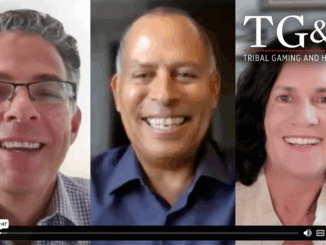In our “From One Operator to Another” series, we feature voices straight from the industry — sometimes through candid interviews, and other times through articles written by operators themselves. Either way, it’s about sharing real stories, lessons learned, and on-the-ground insights that only come from living this workday in and day out.
Hospitality Is a Human Business — So Let’s Act Like It
Employee engagement in the hospitality industry isn’t achieved through theory alone; it must show up in daily practice. At a casino resort, where fast-paced operations, diverse teams, and high guest expectations converge, Emotional Intelligence (EQ) and Psychological Safety aren’t “nice-to-haves.” They’re operational imperatives.
In my earlier piece, “Employee Engagement: More Than a Buzzword, It’s the Bedrock of Success,” I unpacked the theory behind authentic team member engagement. But theory doesn’t drive loyalty or solve problems on the casino floor.
Practice does.
This article explores how EQ and psychological safety come alive across core hospitality functions — from housekeeping to security. These aren’t abstract concepts; they’re the real, everyday moments we’ve all experienced, where leaders either strengthen culture or slowly erode it.
Front Desk: Empathy Turns Frustration into Loyalty
Theory in Action: Emotional Self-Regulation + Empathy
The guest arrives at the front desk, full of excitement to check in, drop their bags, and begin enjoying the resort. You can feel their energy. You also know the news you must deliver isn’t going to be welcomed: their room won’t be ready until after 4:00 p.m. In that moment, you face a choice. Do you fall back on policy, or do you acknowledge their disappointment with empathy and help keep the excitement alive?
Here’s how it plays out when EQ is in action:
“I’m so sorry for the delay — your room is being inspected to ensure our standards. If you’d like, I can store your luggage and have it waiting in your room once it’s ready. In the meantime, we have a beautiful wine bar featuring local vineyards, and I’d love to treat you to a glass while we put the finishing touches on your room. As soon as it’s ready, we’ll send you a text so you can head straight up without waiting.”
Notice the difference? It’s not just a drink ticket; it’s care, warmth, and an invitation. Nine times out of ten, the guest later remembers how they felt more than the room itself.
Emotional regulation prevented escalation; empathy built loyalty.
Engineering: From Firefighting to Preventing Fires
Theory in Action: Feedback Loops + Ownership Mindset
If you’ve worked in engineering, you know the drill: escalators stall on a Friday night, lights flicker during a concert, or the AC crashes during a heatwave. For years, it can feel like living in reaction mode.
That changed for us when we introduced a proactive preventive maintenance system. One of our engineers noticed a power flickering in the event center — not a crisis yet, but there’s a concert tonight. He flagged it, it got fixed, and no one outside the team ever knew. We celebrated the win out loud:
“That’s exactly the kind of catch that keeps us running smoothly.”
Suddenly, the team shifted from firefighting to scanning for risks before they became problems. That’s pride, not panic. And pride sustains performance.
Housekeeping: Turning Observations into Standards
Theory in Action: Maslow’s Esteem Needs + Engagement Drivers
Busy weekends are when consistency is most at risk. One of our housekeepers noticed that, under pressure, some sanitization steps were being skipped. Instead of staying quiet, she spoke up during the pre-shift huddle and suggested adding a step to the checklist to keep everyone on track:
“I thought this could help us stay on track and still provide our guests the very best when we’re slammed.”
Leadership didn’t just adopt it; we thanked her publicly in the next meeting. The addition to the checklist became a property-wide standard, and our cleanliness scores climbed.
But here’s the bigger point: when frontline team members see their ideas come to life, they don’t just follow standards — they create them. Recognition fuels confidence, confidence sparks innovation, and listening builds authentic engagement.
Food & Beverage: Coaching Instead of Clashing
Theory in Action: Self-Awareness + Coaching Mindset
F&B kitchens are pressure cookers — literally and figuratively. In the middle of that heat, a sous chef who felt overlooked, overworked, and underappreciated was ready to confront the executive chef. But even in that charged moment, he paused and ran through The Three Questions:
Does this need to be said?
Does it need to be said by me?
Does it need to be said right now?
The sous chef took a step back, refined the message, and expressed his frustrations constructively. Instead of a blow-up, the conversation turned into a mentorship moment.
The relationship deepened, clarity replaced conflict, and the team gained a future leader instead of losing one to frustration.
Security: Vulnerability on the Radio
Theory in Action: Modeling Vulnerability + Building Trust
Security incidents can get messy fast — stolen tickets, unruly guests, even the occasional fight. After one particularly chaotic call, our supervisor could have lectured the team. Instead, he opened with:
“I’ll be honest — I could have communicated better out there. Let’s talk about what we saw and what we’d do differently.”
That single act of vulnerability and ownership from the supervisor shifted the entire tone. Instead of silence or finger-pointing, the team leaned in, shared openly, and even updated the radio code system together.
Trust doesn’t come from perfection — it comes from a leader’s willingness to admit mistakes and step forward first.
Spa: Psychological Safety Elevates Guest Experience
Theory in Action: Psychological Safety
In the spa, details matter — temperature, music, timing, and tone all shape the guest’s experience. One attendant noticed that a particular massage room felt drafty and guests often pulled the blanket tighter, but she hesitated to mention it after being brushed off in the past.
When we introduced the norm that “every opinion matters,” she shared her observation in the daily huddle. Leadership took it seriously, adjusted the venting, and guest comment scores rose immediately.
The bigger win? The team saw firsthand that speaking up — no matter how small the detail — could improve both the work environment and the guest experience.
When psychological safety is present, team members stop second-guessing themselves and start shaping solutions.
EQ and psychological safety are often confined to HR seminars or slide decks. But in casino resort hospitality, where culture is delivered in real time by real people, these tools are mission-critical.
Great leaders don’t just understand the theory; they make it visible in every action.
Here are five daily reminders I use myself and encourage my leaders to carry with them:
“Slow is smooth. Smooth is fast.” Pause before reacting.
“Name the win.” Recognize contributions publicly, promptly, and specifically.
“Clear is kind.” Deliver feedback with both directness and empathy.
“Everyone has a voice.” Encourage input from all, not just the loudest.
“Own the moment.” Treat disruptions as teachable, coachable moments.
Conclusion: Theory Is the Map—Practice Is the Journey
Leadership is ultimately measured by how well it turns values into behavior. At a casino resort, where experience is everything, embedding EQ and psychological safety into daily work isn’t soft — it’s strategic.
When leaders commit to this work, they don’t just build teams; they foster cultures of innovation and belonging. They transform workplaces into communities. And they create places where both employees and guests want to be.




